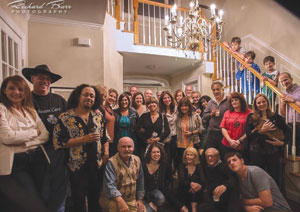
By Rachel Levy Lombara, Ph.D.
“A memorable quotation is a precious thing.” –Me
Let me explain why. Have you noticed that Facebook has become host to a parade of quotes? Dressed in decorative fonts and set on handsome back-grounds, we seem to love them. Quotes in social media, like energy bars, seem to fulfill a need in the fast-paced culture in which we live. Information is no longer a scarce commodity. Good quotes help us in our journey, directing our attention toward those most important sights along the way, reminding us when to rest, when to push, and what is really important.
As a psychologist who has spent years helping people resolve problems and improve their lives, I agree with this Winston Churchill quote: “It is a good thing… to read a book of quotations.” Quotes often distill the best of what a given teacher has to offer. Sharing quotes from leaders in positive change can educate and then mobilize the rest of us to take constructive action.
Over a year ago, I formed an online group to explore whether a virtual community could be created through social media that offered some of the same benefits of an actual community. This community, however, consisted of more like-minded individuals than one might find a physical neighborhood. Could the tangible benefits of what psychologists call “social support” be achieved online?
We discovered it could. Participants soon began revealing more of them-selves, rewarded by the support, understanding and helpful feedback. We shared ideas, learned more about our-selves from the feedback we received and learned a lot about each other.
One member introduced us to the concept of “Anam Cara.” In Celtic tradition, Anam (soul) and Cara (friend) is a connection with someone that goes beyond physical or even temporal boundaries. With Anam Cara, you reveal the hidden intimacies of your life, your mind, your heart. This special type of friendship cuts across all conventions; it is an act of recognition and belonging that joins us above and beyond all else.
We agreed there is a great need in everyone’s life for an Anam Cara, a relationship in which you are understood as who you are, without mask or pretense. It is when you are understood, that you truly feel at home and can heal, awakening the vast possibilities within you.
In September, members of our Anam Cara group, many of whom had never met in person, travelled from as far away as Vancouver, B.C., Florida and Maine, to join me and local friends and family in celebrating my birthday. It was, in fact, the Anam Cara group that planned and executed almost all the party arrangements. Contrary to what I expected, I felt no apprehension hosting people I’d never met in person. In fact, any distinction between “real life” and “online” friends disappeared.
As my virtual friends appeared at my door the night before the party, I was struck that they each were EXACTLY as I had known them to be. They were, in life, precisely who they were in our group, an impression we all shared and marveled at in the subsequent days.
The party was extraordinary. When I looked around that night, I saw old friends, new friends and my family all delighting in each other’s company, talking animatedly, laughing, grabbing each other’s arms.
I received great gifts at that party: fragrant candles, hand knit scarves, a painting, glassware, wine, wind chimes, lovely books, and a silver engraved Anam Cara necklace. Most of all, I received the shared warmth of friendship.
A week after the party, when the last guest left for the airport, I sat at the kitchen table, enjoying the last of chocolate cake #4. I missed my friends, who had ended up staying several nights longer than intended. Bringing my empty dish to the sink, my eyes lit upon the large silver gift box I’d yet to open. A lovely Armonk friend had quietly left it the night of the party.
I smiled at the thought of her. She’s wickedly funny and unfailingly kind. ἀis woman tirelessly and assertively advocated for vulnerable children. I lifted the the top of the box and pulled out a frame. On it, artfully written, was this quotation:
The Best Things in Life Aren’t Things
The ultimate quote, it somehow captured everything I believed to be true. The quote danced in my head for weeks afterwards. An amateur artisan, I found myself hammering it into leather cuffs, inscribing it on silver bracelets, and stenciling it onto t-shirts. The irony of writing, “the best things in life aren’t things” on “things” didn’t escape me. It made me smile.
Dr. Rachel Levy Lombara is a NYS licensed clinical psychologist and former scientist at Columbia-Presbyterian Med-ical Center. She now works with people individually in her Chappaqua office. Like quotes, she believes that therapy is best when it’s brief and to the point.
